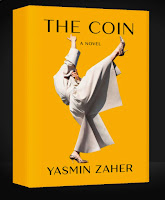Picked up a book and finished it really fast because it isn't my genre. It indeed isn't. In the content page, I saw 94 short chapters and blinked. Okay. That is going to take me slightly longer than 45 minutes to finish it with a fair critique.
Yasmin Zaher's debut novel 'The Coin' (2023) follows the odd little life of rich-enough Palestinian narrator who's carving a life out for herself in New York City as a school teacher in 2016 or so, after the death of her parents. (Reviews here, here, here and here.)
The narrator teaches at the middle school in Manhattan for boys, and her side hustle is illegally selling Birkin bags through a pyramid scheme. She's wealthy enough but she's broke. Her money is controlled by her brother and he doesn't grant her full access to it, except a monthly allowance. In spite of having a full wardrobe of designer clothes and such, she has to supplement this income on a day to day basis.
The narrator is obsessed about hygiene and dirt. There's an odd fascination with American consumerism versus her displacement and sense of belonging in this country. The coin referred to is the small silver shekel that she had swallowed as a child. She is convinced that this coin is embedded somewhere in her back, in a spot that is impossible to clean. Of course that's a metaphor. Metaphors are everywhere in this story. The author said, "in my family, America was both the key and the curse."
Trenchcoat believed that one only belongs to a certain class inasmuch as one dresses, speaks, walks, shops, or takes as a certain class does. But his performance was not total. He smiled a lot, he felt comfortable in his own skin, something that made me suspicious from the beginning. Why is is that the rich are uptight and the poor are themselves?
The unnamed narrator's little scheme sees her traveling to Paris with con-artist Trenchcoat to get the Hermès bags for the pyramid scheme. She then removed herself from it before any criminal repercussions happened. Then she built a jungle in her apartment, thinking that she can control the 'wildlife' there. She got even more obsessed with cleanliness and dirt. Then her life unraveled. The rift between her body and mind grew.
It's really not my kind of book. Read the metaphors and decipher them in the way you want. There're plenty of social themes at play. No matter how much the narrator tries to escape her family history and her reality, she never manages to get away. She returns to herself, a damaged filthy self as she sees it, no reprieve from the 'curse', which is extremely real to her.
In an interview with Vogue in July 2024, when asked about her opinions on writing Palestinian stories against the backdrop of what's happening to Palestine and Palestinian lives, the author said,
What is it like to tell a distinctly Palestinian story in fiction right now, while Palestinian life feels so imperiled?
I have very mixed feelings about my novel coming out at this time. Publishing a novel is a dream come true for me, but the joy is muted by grief. Deep inside, I also know that current events are driving some of the interest in the book, and I feel very uncomfortable with that because I never considered myself as speaking in the name of my people. But I tell myself that identity is not pure, that life is messy, and, maybe most importantly, that literature is at its best when it resists the boxes. The Coin is a fun and decadent novel, it sometimes even borders on chick lit, but it’s also dark and you smell the blood in the air, so I’m satisfied with its contradictions.

No comments:
Post a Comment